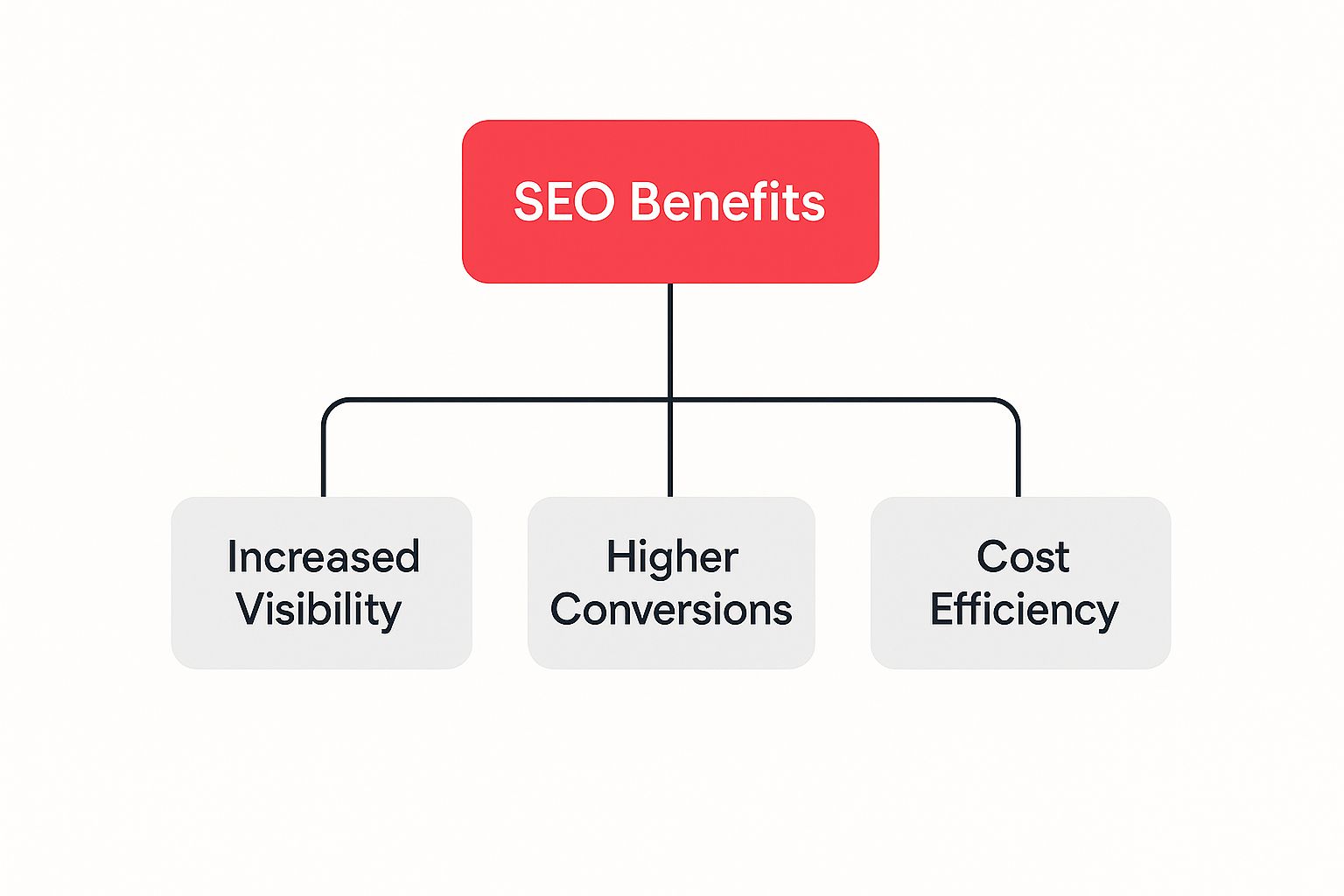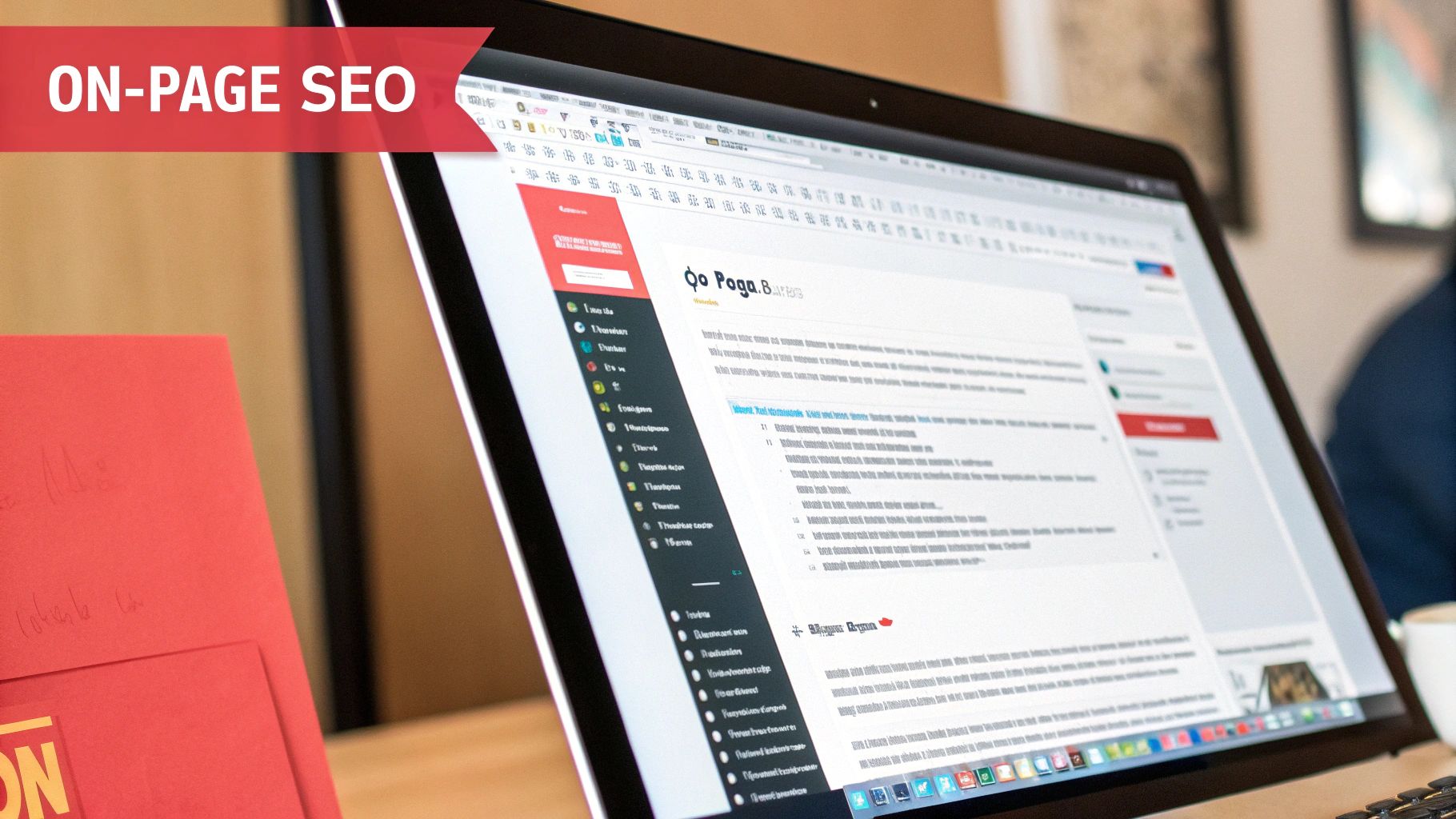Shopify SEO Services for Shopify: UK Merchant's Guide
SEO services for Shopify are more than just a marketing expense; they’re a specific set of strategies designed to get your store seen in search results, pulling in more organic traffic and ultimately more customers. This isn't your run-of-the-mill SEO. It’s an approach that understands the unique technical setup and competitive hurdles of the Shopify platform which is crucial for UK merchants wanting to make a name for themselves in a very crowded market.
Why Your Shopify Store Needs Specialist SEO
Getting your Shopify store live is a great first step but the real work starts when you try to attract consistent, high-quality traffic. Many UK store owners quickly realise that generic SEO advice just doesn’t cut it. Why? Because Shopify, for all its strengths, comes with its own set of quirks. Without a specialist eye, it’s all too easy to get lost in the digital noise.
Think of standard SEO as a general road map. It’ll point you in the right direction, sure. But specialist SEO services for Shopify are like having an expert guide who knows the terrain inside and out, especially the competitive UK landscape. That level of expertise is what helps you sidestep the common pitfalls and find the most direct path to your customers.
Common Pitfalls for UK Merchants
One of the biggest issues we see with UK Shopify stores is duplicate content. This often happens by accident when a store owner uses the standard product descriptions straight from their suppliers. In the UK, the competition is just too fierce for that to work anymore. According to recent findings on UK Shopify SEO practices, countless merchants are still using these duplicated descriptions which seriously hurts their visibility on Google. You can find more on Shopify SEO best practices over on optidan.com.
Simply having a beautiful store is not enough. If search engines can’t efficiently find, understand and trust your content, your ideal customers will never discover you. Specialist SEO ensures your digital shopfront is not just attractive but also perfectly optimised for discovery.
This is a point Shopify itself makes clear. In its own guides, the platform shows how crucial on-page optimisation, like writing unique product descriptions, really is.

As the screenshot shows, optimising individual pages is fundamental. That’s why moving beyond generic supplier text is non-negotiable if you want to rank well.
Beyond the Basics of Ecommerce SEO
A specialist agency gets into the technical weeds of the platform. They zero in on the critical details that general SEO often misses, making sure your store isn’t just visible but is actually set up to convert.
Here are a few key areas where specialists make a real difference:
- Technical Architecture: They tackle Shopify-specific problems like messy URL structures for collections and managing canonical tags for product variants to prevent those damaging duplicate content penalties.
- App Integration: They check that your third-party apps aren’t killing your site speed which is a massive ranking factor for all search engines.
- Structured Data: They implement advanced schema markup for products, reviews and FAQs so your listings pop in search results with eye-catching rich snippets.
At the end of the day, investing in specialist SEO is about turning an invisible online shop into a proper e-commerce brand. It’s the key ingredient for building steady, long-term growth in the competitive UK market.
The Four Pillars of Shopify E-commerce SEO
To really get your head around what specialist SEO services for Shopify actually do, it helps to break the whole thing down into its core parts. SEO isn't some single, mysterious dark art; it’s a coordinated effort across four distinct but interconnected areas.
A simple way to picture it is to think of your Shopify store as a real, physical shop. This analogy helps make sense of what each pillar does and more importantly why you can't afford to ignore any of them. Each one supports the others—let one slide and the whole structure starts to wobble.
Let's walk through these four foundational elements.
Technical SEO: Your Store's Engine
Technical SEO is all the work that happens behind the scenes to make sure your website runs like a dream and is easy for search engines like Google to understand. In our shop analogy, this is your building's infrastructure. It's the solid foundation, the logical layout of the aisles, the speedy checkout tills and the well-organised stockroom.
Without solid technical SEO, everything else you do becomes a struggle. Customers would quickly leave a physical shop if the aisles were cluttered or the queue was a mile long. It’s the same online. Shoppers and search engine crawlers will bail on a site that's slow, confusing or just plain broken. A technical SEO service ensures your digital shop is built to perform from the ground up.
On-Page SEO: Your Digital Shopfront
On-Page SEO is all about optimising the individual pages of your website to improve your rankings and give users a great experience. This is the art of creating a compelling and easy-to-navigate digital shopfront. Think of it as the clear sign above your door, the helpful product labels on the shelves and the well-written descriptions that help a customer decide to buy.
This involves carefully researching and placing keywords in your product titles, descriptions and category pages. But it's more than just that. It's about making sure your content genuinely answers customer questions and convinces them that your product is the one they need. Great on-page SEO makes your store intuitive for both people and search engines.
Content SEO: Your Expert Sales Assistant
Content SEO is the practice of creating valuable, relevant and consistent content to attract and keep your target audience engaged. In our shop analogy, this is your expert sales assistant. This person doesn't just point to products; they offer advice, give demonstrations and build a real relationship with customers, making them feel confident and informed.
This infographic shows how these efforts translate into real business benefits.

As the diagram shows, a solid SEO strategy directly leads to more visibility which in turn drives higher conversion rates and makes your marketing spend far more efficient.
For a Shopify store, this pillar often includes things like:
- Blog Posts: Articles that answer common questions your customers are asking.
- Buying Guides: In-depth guides that help people choose the right product for their needs.
- How-To Videos: Engaging videos that show your products in action.
This kind of content establishes your store as an authority in your field. It builds trust and attracts buyers who might not be ready to purchase today but are in the middle of their research.
Off-Page SEO: Your Reputation Around Town
Off-Page SEO covers all the actions taken outside of your own website to improve your rankings. This is your store’s reputation around town. It’s the positive word-of-mouth recommendations, the glowing reviews in a local magazine and the partnerships you build with other respected businesses.
In the digital world, this reputation is primarily built through high-quality backlinks . A backlink is simply a link from another website to yours and search engines see them as votes of confidence. The more reputable "votes" you collect, the more trustworthy your store appears.
A professional SEO service builds this authority by earning links from relevant UK blogs, industry publications and news sites. This isn't a numbers game; it's all about quality. A single link from a trusted source is worth far more than hundreds from low-quality sites.
This pillar is crucial for proving your credibility to both search engines and potential customers, securing the kind of organic growth that lasts. If you want to dive deeper, you can explore various top organic search engine optimisation services to boost your rankings and learn more about these strategies.
To bring it all together, here’s a quick summary of how each pillar functions within a Shopify SEO strategy.
| Core Components of Shopify SEO Services |
| :--- | :--- | :--- |
| SEO Pillar
| Primary Objective
| Key Shopify Activities
|
| Technical SEO | Ensure search engines can crawl and index the site efficiently. | Site speed optimisation, mobile-friendliness, fixing crawl errors, implementing structured data. |
| On-Page SEO | Make individual pages relevant and user-friendly for target keywords. | Keyword research, optimising product/category pages, meta titles and descriptions. |
| Content SEO | Build authority and attract customers through valuable information. | Creating blog posts, buying guides, video tutorials and case studies. |
| Off-Page SEO | Build trust and authority through external validation. | Earning backlinks from reputable websites, digital PR and managing online reviews. |
Each pillar plays a vital role. A fast, technically sound site with poor content won't rank. Great content on a broken site won't get seen. And without a strong reputation, even the best shopfront can be overlooked. A successful strategy needs all four working in harmony.
Building a Technically Sound Shopify Store
A visually stunning Shopify store doesn't mean much if search engines can't find, crawl and understand it. This is where technical SEO comes in. It’s the foundation of any solid SEO strategy, making sure your site isn't just attractive to customers but is also built perfectly for search engine crawlers.
Think of it like the stockroom of a busy retail shop. If it’s disorganised, with products scattered everywhere and aisles blocked, staff can't find anything to put on the shelves. A technically poor website is exactly like that to Google; its crawlers struggle to navigate the mess, meaning your products might never be found by potential buyers. Professional SEO services for Shopify act as the master organiser for this digital stockroom.

Organising Your Digital Stockroom
The first step is always a thorough clean-up. A technical audit pinpoints all the backend issues that could be holding your store back. The process is like a full inventory check, finding everything that’s broken, out of place or slowing things down.
A good technical audit will uncover issues like:
- Crawl Errors and Broken Links: These are dead ends for both users and search engines. Fixing them ensures everyone has a smooth journey through your site.
- Slow Page Speed: In e-commerce, speed is everything. Just a one-second delay in page load time can lead to a 7% reduction in conversions. Technical SEO tackles this by optimising images, streamlining code and using browser caching.
- Poor Mobile Experience: With so much online shopping happening on mobile, a non-responsive design is a huge problem. Your store has to work flawlessly on any screen size, period.
A robust technical foundation isn't a one-time fix; it's the bedrock of long-term organic success. By ensuring search engines can efficiently access and interpret your content, you set the stage for all other SEO efforts to succeed.
To make sure your store's technical foundation is solid from the get-go, using an SEO technical audit service can identify and resolve these critical issues before they ever impact your sales. This initial deep dive provides a clear roadmap for all future technical work.
Managing Shopify’s Unique Challenges
Shopify is a fantastic platform but it has its own technical quirks that need an expert eye. One of the most common issues is duplicate content which often pops up from product variants and collection page filters.
For instance, if you sell a t-shirt in five colours and four sizes, you could accidentally create twenty different URLs for what is essentially the same product. This confuses search engines, forcing them to guess which page to rank. Technical SEO solves this with canonical tags —a small piece of code that tells Google which version of a page is the "master copy" and should be prioritised in search results. For a more detailed look into how a site is put together, our guide on website development explained offers some great insights.
Implementing Schema Markup for Better Visibility
Another powerful tool in the technical SEO kit is schema markup . This is a type of structured data that gives search engines more detailed information about your pages. Think of it as adding extra-descriptive labels to the boxes in your stockroom so everyone knows exactly what's inside.
For a Shopify store, this means adding specific code that tells Google things like:
- This is a product page.
- The product’s name is "Organic Cotton T-Shirt".
- Its price is £25.00.
- It has an average customer rating of 4.8 stars from 52 reviews.
- It is currently in stock.
When you provide this information, Google can display it directly in the search results as "rich snippets." These enhanced listings—showing prices, ratings and availability—really stand out from the competition and can significantly boost your click-through rates, driving more qualified traffic right to your product pages.
Creating Product Pages That Rank and Convert
If a technically sound store is the foundation, your product and category pages are where the real magic happens. Think of them as your digital shopfront—the place where customers finally meet your products. It's your single best chance to turn a casual browser into a loyal buyer.
To pull this off, these pages have to do two jobs at once. They need to satisfy the algorithms of search engines and the emotions of human shoppers.
First things first: ditch the generic, copy-pasted text from your suppliers. It’s a non-negotiable. Using the same description as dozens of other shops is a surefire way to get lost in the search results. A professional SEO service for Shopify will always focus on crafting completely unique content that makes your store stand out.

Writing Descriptions That Sell and Rank
The secret is simple: write for people first, search engines second. A great product description does more than just list a few features. It tells a story. It answers questions before they’re even asked and gently overcomes any potential doubts a customer might have. It has to speak directly to what they need and want.
For example, a generic description might just say, "100% cotton t-shirt." But a compelling, SEO-optimised description paints a picture: "Experience all-day comfort with our unbelievably soft, 100% organic cotton t-shirt, perfect for sensitive skin." See the difference? The second version weaves in keywords naturally whilst tapping into the customer's desire for comfort, quality and well-being.
To get there, your product pages must:
- Integrate Target Keywords Naturally: Weave your main and secondary keywords into headings, body text and image alt text. It should feel completely natural to the reader, never forced.
- Answer Key Customer Questions: Directly address common queries about sizing, materials, care instructions and how to use the product.
- Highlight Benefits Over Features: Don't just list what a product has ; explain how it helps the customer. "Water-resistant coating" becomes "Keeps your belongings bone-dry in a sudden downpour."
The Difference Between Existing and Selling
Let's make this real. Imagine you sell a high-quality leather wallet. A basic listing might just state the dimensions, the material and how many card slots it has. The page exists but it doesn't sell.
An optimised page, on the other hand, would bring it to life. It would talk about the expert craftsmanship, the rich smell of genuine leather and how its slim design fits comfortably in a pocket without that awkward bulge. It would showcase the wallet with high-quality images from every angle, maybe even a short video. This approach transforms a simple product listing into a persuasive sales pitch.
A product page that only lists technical specs is like a salesperson who just reads from a manual. A page that tells a story and solves a problem is like a trusted advisor helping the customer make the right choice.
This is the fundamental difference between a page that’s just taking up space and one that actively turns visitors into customers.
Expanding Your Reach with Strategic Content
Your product pages are the stars of the show but they're not the only players on the field. Strategic content like buying guides and blog posts can attract customers at every stage of their journey, from the moment they realise they have a problem to their final buying decision.
This kind of content builds your authority and turns your store into a trusted resource, not just a place to buy things. For instance, if you sell hiking boots, you could create content like:
- A Blog Post: "The Top 5 Hiking Trails in the Peak District for Beginners" brings in people who are into hiking but aren't necessarily looking for new boots... yet.
- A Buying Guide: "How to Choose the Perfect Hiking Boots for Your Next Adventure" captures potential customers who are deep in the research phase, helping them figure out what to look for.
These articles can then link back to your relevant product and category pages. This creates a powerful internal linking network that guides users towards a purchase and tells Google what your site is all about. It's a strategy that not only boosts your SEO by targeting a wider range of keywords but also builds a genuine relationship with potential customers, making them far more likely to buy from you when they're ready.
Earning Trust with Off-Page Authority
So far, we’ve focused on optimising everything on your website, from its technical foundations to its product pages. But how does Google decide if your store is genuinely reputable? It looks for signals from other websites. This is the whole idea behind off-page SEO.
Think of it as word-of-mouth for the digital age. If a well-respected local business owner tells their customers your shop is fantastic, that’s a powerful endorsement. In the online world, high-quality backlinks from relevant UK blogs, news sites and industry publications do exactly the same thing.
A professional agency offering SEO services for Shopify knows that building this kind of authority isn't about trickery or quick wins. It’s about earning a genuine online reputation that proves your credibility to search engines and more importantly to potential customers.
Building Your Digital Reputation
The main goal here is to get high-quality backlinks. A backlink is just a link from one website to another and search engines like Google see these links as "votes of confidence". The more votes you get from authoritative and relevant websites, the more trustworthy your own store appears.
But it’s crucial to understand that not all links are created equal. A single link from a well-known UK lifestyle blog that reviews your product is infinitely more valuable than a hundred links from low-quality, irrelevant websites. Quality always trumps quantity.
Building a strong backlink profile is like building a strong professional network. Connections with respected industry leaders (high-authority sites) carry more weight and open more doors than having hundreds of random acquaintances who have no relevance to your field.
This distinction is what separates effective, modern SEO from outdated, spammy tactics that can actually get you penalised.
Strategies for Earning Quality Backlinks
So how do professional SEO services earn these valuable links? It’s a strategic process that combines creativity, outreach and the creation of genuinely useful content. It’s not about buying links; it’s about giving other websites a compelling reason to link to you.
Some common strategies include:
- Digital PR Campaigns: This involves creating newsworthy stories, data-driven reports or unique content that journalists and bloggers in your niche will want to cover. For example, a UK-based sustainable fashion brand might release a report on the environmental impact of fast fashion, earning links from eco-conscious publications.
- Content Creation: Developing genuinely helpful resources like in-depth buying guides, interactive tools or original research that others in your industry will naturally want to reference and share with their own audiences.
- Guest Blogging: Writing articles for respected blogs in your sector. This not only provides a valuable backlink but also exposes your brand to a new, relevant audience.
These efforts are fundamental for driving organic traffic. In fact, organic search accounts for approximately 13.81% of traffic to Shopify stores worldwide, showing just how important SEO remains for bringing in visitors. In the UK, around 60% of Shopify stores have implemented search engine optimisation strategies, leading to significant improvements in visibility. You can see more data about Shopify performance statistics at uptek.com.
Ultimately, off-page SEO is about proving your store’s value beyond its own pages. By building a network of trust and authority across the web, you send a powerful signal to Google that your Shopify store is a credible and important player in its market. This leads directly to higher rankings, more sustained organic traffic and long-term business growth.
Choosing the Right Shopify SEO Partner in the UK
Picking an SEO agency is one of the most important decisions you’ll make for your business. It's not about hiring a supplier to just tick boxes off a list. You’re looking for a genuine partner—someone who gets your UK-based Shopify store and is as invested in its long-term success as you are.
The right team will be obsessed with the results that actually matter, like revenue and profit, not just chasing vanity metrics like a bump in traffic.
Finding that partner starts with asking the right questions. The answers you get will tell you everything about their experience, their strategic thinking and whether they’re the right fit for your brand. It’s how you separate the true experts from those selling generic, one-size-fits-all packages.
Key Questions to Ask Potential Agencies
Before you commit to anything, you need to dig a little deeper. The quality of an agency’s answers will reveal their real capabilities and how they approach their work.
Here’s a simple checklist of essential questions to get you started:
- Do you have specific experience with Shopify? Don't be shy about asking for case studies or examples of UK-based Shopify stores they’ve helped. Shopify has its own technical quirks and you need an agency that knows its way around them.
- How do you measure success? Listen for answers that go beyond rankings and traffic. A great partner will immediately start talking about conversion rates, return on investment and ultimately a tangible increase in your revenue.
- What does your communication and reporting look like? You need a partner who keeps you in the loop with clear, regular updates. Ask how often you’ll get reports and what key performance indicators (KPIs) they actually track.
- What’s your approach to link building? This one is crucial. A reputable agency will talk about earning high-quality links through digital PR and brilliant content, not buying them from dodgy, low-quality sources. For a deeper dive, check out our guide on choosing a digital agency for ecommerce growth.
Spotting the Red Flags
Knowing what to look for is only half the battle; you also need to know what to avoid. Some promises sound too good to be true because, well, they are. Be wary of any agency that makes unrealistic guarantees or isn’t completely transparent.
A critical decision for any UK merchant is understanding the benefits and process of Outsourcing a Shopify SEO Expert. This step ensures you bring in specialised knowledge tailored to your platform rather than settling for a generalist approach.
The UK e-commerce market is proof of the incredible returns that great SEO can deliver for Shopify stores. Done right, SEO provides a much higher ROI than paid advertising. For every £1 spent on SEO, e-commerce brands report an average return of over £3 .
Even better, users coming from organic search convert 84.62% more often than those from PPC ads—a vital statistic for any UK merchant looking to maximise sales.
Ultimately, choosing the right partner comes down to finding a team that aligns with your business goals, demonstrates genuine Shopify expertise and operates with complete transparency. It’s one of the most important investments you can make in your store's future.
Shopify SEO Services: Your Questions Answered
Diving into the world of SEO always brings up a few questions. To help clear things up, here are some straight answers to the most common queries we get from UK merchants thinking about professional SEO services for Shopify .
How Much Do Shopify SEO Services Cost in the UK?
This is the big one and the honest answer is: it varies. The cost really depends on your store's size, how fierce the competition is in your niche and exactly what you need us to do. Generally, retainers in the UK can range from a few hundred to several thousand pounds a month.
It helps to stop thinking of it as a cost and start seeing it as an investment in your store’s future. The real focus should be on the return you’ll get—the tangible growth in revenue—not just the monthly figure.
How Long Until I See Results From Shopify SEO?
SEO is a long game, not a quick fix, so a bit of patience is needed. You’ll usually start seeing the first positive signs, like better keyword rankings and your store popping up more often in searches, within the first 3 to 4 months .
The more significant results—think a real jump in organic traffic and sales—typically start showing up after 6 to 12 months of consistent, smart work. It's this steady, strategic effort that builds success that lasts.
While many store owners can handle basic on-page SEO tasks like writing product descriptions, the more complex technical aspects, strategic content creation and authority building require specialised expertise and are extremely time-consuming.
Can I Do Shopify SEO Myself?
Absolutely. It's definitely possible for store owners to get their hands dirty with some of the SEO basics. Writing unique product descriptions or tweaking your meta titles are great places to start if you're keen to get involved.
However, the deeper technical work, building a consistent content strategy and earning backlinks to build your store's authority—that's a different beast. It demands a high level of expertise and a serious amount of time. Bringing in the professionals fast-tracks your results and frees you up to do what you do best: running your business and looking after your customers.
Ready to get your Shopify store the visibility it deserves and drive real, sustainable growth? The expert team at Superhub specialises in creating bespoke SEO strategies that deliver genuine results for UK businesses. Contact us today to find out how we can help your brand thrive.
Want This Done For You?
SuperHub helps UK brands with video, content, SEO and social media that actually drives revenue. No vanity metrics. No bullshit.



